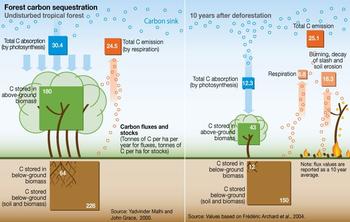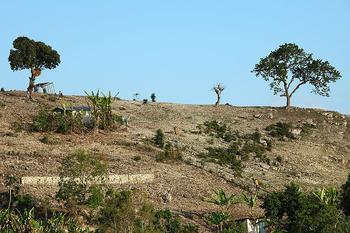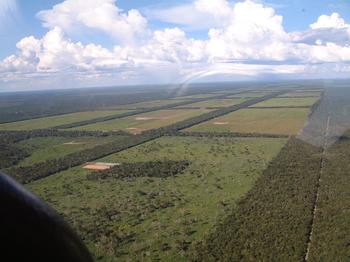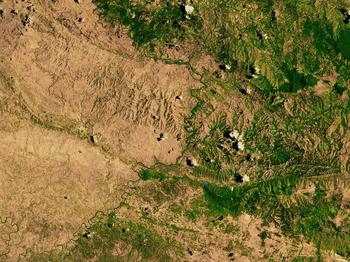Impacts of deforestation
- Impact on atmosphere:
Deforestation enhances a key role concerning climate change. Trees are 50 percent carbon. When they are felled or burned, the carbon dioxide (C02) they store can escapes back into the air. Deforestation is the second largest anthropogenic source of carbon dioxide to the atmosphere with 12 % (with a range between 6 and 17% due to uncertainties), after fossil fuel combustion. (FAO 2006 & van der Werf 2009)
- Impact on water cycle
Deforestation has a big impact on water cycles and local climates. Normally, trees release rain- and groundwater through evaporation into the atmosphere, producing localized humidity. In addition, the roots help to infiltrate water into the ground. Without trees less water evaporates into the atmosphere, the land becomes drier and less stable. Followed by an increased run-off and leaching, which contributes to erosion and floods. (Science Learning Hub 2009)
- Impact on Soils
Soils build up a unique relationship with the forest trees that they support. When the vegetation dies leaves and other vegetable matter are returned to the soil surface. (Soil-Net 2016d) Without the forest vegetation, the soils are more vulnerable to erosion (soil degradation).
- Impact on Biodiversity
The most dramatic impact is a loss of habitat for millions of species. Forests are among the most important repositories of terrestrial biological diversity. Together, tropical, temperate and boreal forests offer very diverse habitats for plants, animals and microorganisms. Seventy percent of Earth’s land animals and plants live in forests, and many cannot survive the deforestation. (FAO 2016 & National Geographic 2016)
- Economic impact
In theory, logging can be a sustainable activity, generating an ongoing source of revenue without diminishing the resource base - especially in secondary forests and plantations. However, most rainforest logging is not sustainable in practice. The importance of forestry is decreasing in many former wood-exporting countries in Southeast Asia and West Africa due to overexploitation. Short-term economic exploitation through deforestation can be devastating to the long-term economy of developing countries not only by annihilating vital ecosystems that afford important services, but also by destroying potential forest products. (Butler 2012)



